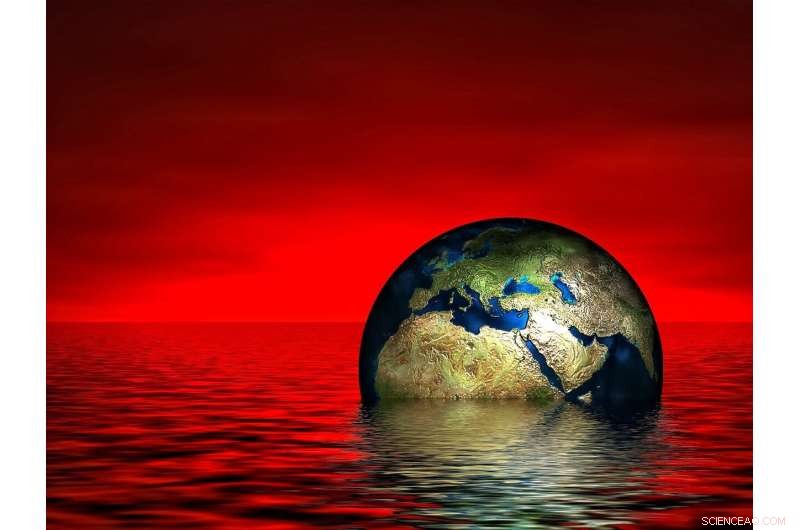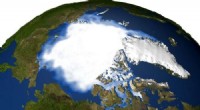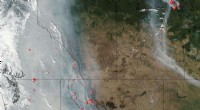
Wetenschap
De klimaatcrisis is echt, maar overmatig gebruik van termen als crisis en noodtoestand brengt risico's met zich mee

Krediet:Pixabay/CC0 publiek domein
"Crisis" is een ongelooflijk krachtig woord, dus het is interessant om te zien hoe de uitdrukking "klimaatcrisis" onderdeel is geworden van de lingua franca.
Ooit geassocieerd met slechts een paar "openhartige" wetenschappers en activisten, is de uitdrukking nu mainstream geworden.
Maar wat verstaan mensen onder de term 'klimaatcrisis'? En waarom maakt het uit?
De mainstreaming van crisispraat
Het zijn niet alleen activisten of wetenschappers die aan de alarmbel trekken.
VN-secretaris-generaal Antonio Guterres gebruikt nu routinematig dramatische zinnen als "ons eigen graf graven" bij het bespreken van het klimaat. Bill Gates adviseert ons om "klimaatrampen" te vermijden.
Deze taalkundige mainstreaming markeert hertekende strijdlijnen in de 'klimaatoorlogen'.
Ontkenning is op de terugtocht. Het debat over klimaatverandering gaat nu over wat er moet gebeuren en door wie?
Wetenschappers, die de volledige autoriteit van hun beroep gebruiken, zijn de sleutel geweest tot het veranderen van het discours. De hoofdauteurs van de rapporten van het Intergouvernementeel Panel over klimaatverandering (IPCC) doen nu niets meer en praten openlijk over massale hongersnood, uitstervingen en rampen.
Deze publieke figuren hopen duidelijk burgers, bedrijven en overheden aan te zetten tot radicale klimaatactie.
Maar voor veel gewone mensen kan klimaatverandering ver van het dagelijks leven lijken. Het is geen "crisis" zoals de pandemie is geweest.
Natuurlijk zijn velen van mening dat klimaatexperts het probleem te lang hebben onderschat.
En toch garandeert de nieuwe alomtegenwoordigheid van sirene-termen als klimaat "crisis", "noodgeval", "ramp", "panne" en "calamiteit" geen gedeeld, laat staan geloofwaardig, begrip van hun mogelijke betekenis.
Dit is van belang omdat dergelijke termen de neiging hebben om te polariseren.
Weinigen twijfelen nu aan de realiteit van klimaatverandering. Maar hoe we de implicaties ervan beschrijven, kan gemakkelijk eerdere confrontaties tussen 'gelovigen' en 'sceptici' herhalen; "realisten" en "bangmakers." Het resultaat is nog meer politieke traagheid en patstelling.
We zullen het beter moeten doen.
Vier ideeën voor een nieuwe weg vooruit
Termen als 'klimaatcrisis' zijn niet meer weg te denken. Maar wetenschappers, leraren en politici moeten slim zijn. Een scherp besef van wat andere mensen kunnen denken als ze ons 'crisis!' horen roepen. kan leiden tot betere communicatie.
Hier zijn vier ideeën om in gedachten te houden.
1. We moeten dystopische en reddingsverhalen uitdagen
Een crisis is wanneer dingen uit elkaar vallen. We zien dagelijks nieuwsberichten over crises:overstromingen in Pakistan, economische ineenstorting in Sri Lanka, hongersnood in delen van Afrika.
But "climate crisis" signifies something that feels beyond the range of ordinary experience, especially to the wealthy. People quickly reach for culturally available ideas to fill the vacuum.
One is the notion of an all-encompassing societal break down, where only a few survive. Cormac McCarthy's bleak book The Road is one example.
Central to many apocalyptic narratives is the idea technology and a few brave people (usually men) can save the day in the nick of time, as in films like Interstellar.
The problem, of course, is these (often fanciful) depictions aren't suitable ways to interpret what climate scientists have been warning people about. The world is far more complicated.
2. We must bring the climate crisis home and make it present now
Even if they're willing to acknowledge it as a looming crisis, many think climate change impacts will be predominantly felt elsewhere or in the distant future.
The disappearance of Tuvalu as sea levels rise is an existential crisis for its citizens but may seem a remote, albeit tragic, problem to people in Chicago, Oslo or Cape Town.
But the recent floods in eastern Australia and the heatwave in Europe allow a powerful point to be made:no place is immune from extreme weather as the planet heats up.
There won't be a one-size-fits-all global climate crisis as per many Hollywood movies. Instead, people must understand global warming will trigger myriad local-to-regional scale crises.
Many will be on the doorstep, many will last for years or decades. Most will be made worse if we don't act now. Getting people to understand this is crucial.
3. We must explain:a crisis in relation to what?
The climate wars showed us value disputes get transposed into arguments about scientific evidence and its interpretation.
A crisis occurs when events are judged in light of certain values, such as people's right to adequate food, healthcare and shelter.
Pronouncements of crisis need to explain the values that underpin judgements about unacceptable risk, harm and loss.
Historians, philosophers, legal scholars and others help us to think clearly about our values and what exactly we mean when we say "crisis."
4. We must appreciate other crises and challenges matter more to many people
Some are tempted to occupy the moral high ground and imply the climate crisis is so grand as to eclipse all others. This is understandable but imprudent.
It's important to respect other perspectives and negotiate a way forward. Consider, for example, the way author Bjørn Lomborg has questioned the climate emergency by arguing it's not the main threat.
Lomborg was widely pilloried. But his arguments resonated with many. We may disagree with him, but his views are not irrational.
We must seek to understand how and why this kind of argument makes sense to so many people.
Words matter. It's vital terms like "crisis" and "calamity" don't become rhetorical devices devoid of real content as we argue about what climate action to take. + Verder verkennen
How can dermatology take action against climate change?
Dit artikel is opnieuw gepubliceerd vanuit The Conversation onder een Creative Commons-licentie. Lees het originele artikel. 
 Draait op leeg:nieuwe betaalbare katalysator is afhankelijk van stikstoftekorten om ammoniak te produceren
Draait op leeg:nieuwe betaalbare katalysator is afhankelijk van stikstoftekorten om ammoniak te produceren Crowd oil—brandstoffen uit airconditioningsystemen
Crowd oil—brandstoffen uit airconditioningsystemen Fotokatalysator bij lage temperatuur kan de ecologische voetafdruk van syngas verkleinen
Fotokatalysator bij lage temperatuur kan de ecologische voetafdruk van syngas verkleinen Het nieuwe coronavirus in de maling nemen met een nephanddruk
Het nieuwe coronavirus in de maling nemen met een nephanddruk Nieuwe route naar moleculaire draden geschikt voor gebruik in miniatuurelektronica
Nieuwe route naar moleculaire draden geschikt voor gebruik in miniatuurelektronica
Hoofdlijnen
- Reproductie van plantaardige cellen
- Duurzame zeevruchten bovenaan het menu voor nieuwe onderzoeksgroep
- Samengestelde ogen een continu kenmerk van evolutie
- Opkomende infectieziekte bedreigt Darwins kikker met uitsterven
- Hoe beïnvloedt fosforylatie eiwitactiviteit?
- Wat gebeurt er als er geen zuurstof beschikbaar is aan het einde van langzame glycolyse?
- Een ingenieursgids voor het embryo
- Hinderlaag in een petrischaal
- Hoe een zevende-graadsmodel van een dierencel te bouwen
- Nieuwe dateringen stellen de seismische gevaren van fouten in de Iberische keten in Aragón ter discussie

- Opnieuw gemengde mantel suggereert vroege start van platentektoniek

- Het is misschien mogelijk om de ijskappen opnieuw te bevriezen om de opwarming van de aarde te vertragen

- Afbeelding:rook hangt boven de westelijke VS en Canada

- Verschuiving van aarden huizen is schadelijk voor het milieu

 Magnetar-mysteries in onze melkweg en daarbuiten
Magnetar-mysteries in onze melkweg en daarbuiten De jongste leerlingen in de klas zijn minder tevreden met hun leven
De jongste leerlingen in de klas zijn minder tevreden met hun leven Oplossen voor specifieke zwaartekracht
Oplossen voor specifieke zwaartekracht  Hoe je sociale netwerk je kan redden van een natuurramp
Hoe je sociale netwerk je kan redden van een natuurramp Webb onthult kosmische kliffen, glinsterend landschap van stergeboorte
Webb onthult kosmische kliffen, glinsterend landschap van stergeboorte Hoe wordt de U-waarde geconverteerd naar Imperial R Waarde
Hoe wordt de U-waarde geconverteerd naar Imperial R Waarde On-chip nano-optica besturen door grafeen nano-opto-mechanica
On-chip nano-optica besturen door grafeen nano-opto-mechanica Data-relay-satelliet klaar voor service
Data-relay-satelliet klaar voor service
- Elektronica
- Biologie
- Zonsverduistering
- Wiskunde
- French | Italian | Spanish | Portuguese | Swedish | German | Dutch | Danish | Norway |

-
Wetenschap © https://nl.scienceaq.com

